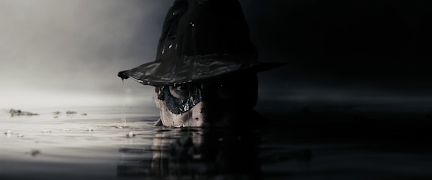Frank Miller's take on The Spirit is hopelessly mannered but beautiful all the same; a mutant movie that sinks Will Eisner's rough and tumble crimefighter into a live action approximation of the messier, sketchier, panels seen in latter-day Sin City comics. Like a Hell and Back or the shorter, punchline focused, interludes collected in Booze, Broads & Bullets, this Spirit represents characters and situations largely unmoored from a strict, logical, narrative. Miller is freewheeling, pinging from one idea to another without any pressing concern for an organic whole. The Spirit - notable as Miller's only feature not co-directed with Robert Rodriguez - employs constant voiceover, shot through with slang excavated from 1930s potboilers, to place us inside the mind of Denny Colt, a zombie policeman who cannot die.
The Spirit peaks very early with a sludgy tar pit duel between Gabriel Macht's Spirit and Samuel L Jackson's master criminal The Octopus. Both men batter and hammer at each other with the unceasing, unbloodied, violence of Looney Tunes cartoons; deploying massive industrial hooks, decapitated heads and crumbling toilets in an effort to vanquish the other. There's a dangling insinuation (quickly tossed off) that these two warriors are at least dimly aware that they are not only invincible but taking part in the opening sequence of a narrative that will extend far beyond this encounter. The bodily punishment that they experience, then quickly heal from, a formality of plotting rather than anything that they should be truly concerned about. Unfortunately, the framing of this commonality departs from these metatextual musings, arriving at a strictly recounted origin episode that's not nearly as entertaining.
Getting back to the asphalt pit punch-up - unlike the dry for wet sequences seen elsewhere in this digital soundstage picture, Macht and Jackson are actually wallowing in this soupy filth. It clings to their clothes and changes their outline. What would be an irrelevant detail in basically any other action entry is lent an extra note of ruggedness here - it's completely at odds with the fast and loose shooting style engendered by this green-screened approach to filmmaking. It's messy and, presumably, requires a lengthy reset. This sodden physicality is further enhanced by cinematographer Bill Pope who, assisted by umpteen CGI studios, manufactures frames busy with particles that are subject to varying degrees of focus. An effect far more in keeping with Miller's ink splashed artwork than anything in either big screen Sin City. The Spirit isn't just this one sequence though. In the main, Miller's film is one long tonal convulsion; a tightrope walk that wavers between a maddening outlet for painfully overwrought acting and the acute visual interest offered by extremely photogenic women acting out their writer-director's dress-up fantasies.


No comments:
Post a Comment